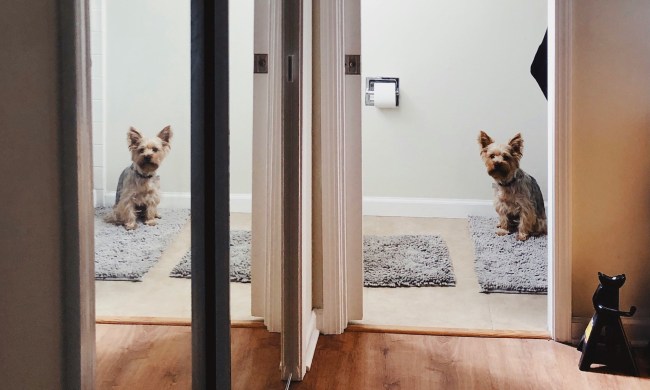The smart and elegant poodle is an eye-catching breed no matter the size, color, or coat length. Many folks appreciate these dogs for their looks and history alone (did you know the breed is German and not French?), but there’s so much more to love about these ever-fashionable pups. There’s no denying their popularity, whether purebred or mixed breed, but are poodles good family dogs?
Only you will know if this breed will mesh well with your lifestyle, but we’ve compiled six reasons why pet owners love their poodles — and why you’ll love them too! We’ll also list some of the challenges that come with owning these dogs because you should be prepared for both the easy and the hard.

Are poodles good family dogs?
There are many reasons to love this intelligent, fun-loving breed, but these six are some of the most popular. Will a poodle be a good fit for your family?
Poodles tend to get along with other animals
Though every animal has their own individual preferences, poodles tend to be friendly with other animals, whether canine or not. The doggie experts at Nylabone, the company which designed some of the most popular chew toys for dogs, says that, typically, “Toy Poodles tend to play with cats, Miniatures generally tolerate them, and Standards pretend they don’t exist.”
This breed comes in three sizes
Just as Nylabone listed, there are three sizes of poodles: toy, miniature, and standard. The toy poodle, which is the smallest, stands 10 inches tall or shorter at the shoulder, while the miniatures are within 10 to 15 inches in height. Standard poodles, which are by far the largest, can measure up to 27 inches at the shoulder, according to the Poodle Club of America.
Poodles can be easy to train
Because of this breed’s high intelligence, training could come easier to them. Hill’s Pet reminds owners that these dogs are very people-oriented and eager to please, so positive reinforcement training is an absolute must. No dog feels good receiving punishment, after all, so poodles are not alone in this.
These dogs love to be with their people
As we recently mentioned, this breed loves its family. They were originally bred as hunting dogs, so it’s no wonder why they enjoy exercising and hanging out with their folks. This means that poodles make loyal, enthusiastic companions for nearly anyone; they can get incredibly attached very quickly (via Hill’s Pet).
Poodles are great adventure buddies
Since poodles love to be active, you’ll have one excited hiking or running partner on your hands. Even a walk in a new place will be stimulating and invigorating for them, so don’t be afraid to let your dog encourage you to get outside. Exercise will have wonderful health benefits for you both, so don’t wait!
These dogs are great with kids
One of the most important aspects of being a family dog includes getting along with everyone in the house — and we mean everyone. Many pet owners are relieved to learn how content poodles are in the company of children, and whether they play together or tolerate each other’s presence, you’re less likely to have an issue with these dogs.

Why poodles may not be the best for your family
Even though poodles have many wonderful qualities, you may also find a trait or two that makes them challenging to live with. These are some of the most common.
These dogs can be naughty when bored
Any pup has the potential to destroy its surroundings when bored enough, but some breeds are more likely than others to indulge in this guilty pleasure. Prestige Animal Hospital notes that poodles can be slower to mature and more prone to rowdiness in their younger years.
To help your poodle stay sane while home alone, make sure to provide them with enough mental stimulation. Puzzle toys and Kong feeders are popular distractions among pet parents, although some extra exercise and affection before you leave could also be enough to satisfy an energetic dog.
Poodles are talented jumpers
You may have guessed from this breed’s luxurious coat that they’re much happier as indoor dogs, and their behaviors confirm this, too. Poodles are excellent at jumping, warns Hill’s Pet, so make sure your fences are high enough before bringing home one of these dogs.
If you like, you can put their jumping skills to good use by training your pup for agility or tricks. This will be a great way for the two of you to bond as well — just don’t forget the treats!
This breed is prone to obesity
For poodles, weight gain can be a big concern. These dogs, like many, love a good snack, but even a bit of extra weight can put your pet at risk for health problems like heart disease, arthritis, and metabolic disorders (via Prestige Animal Hospital). Luckily, these pups will be just as happy to join you on a walk as they would be to relax, so you can work on burning off any extra calories.
What do you think? Are poodles good family dogs? Though many pet parents say yes, the ultimate decision is yours and yours alone. And remember, no dog matches up 100% with their breed’s description, so even a poodle can surprise you.



